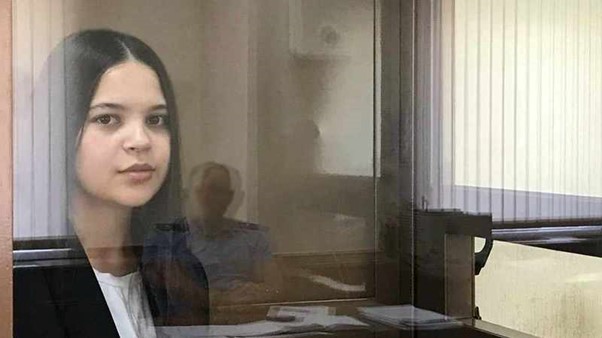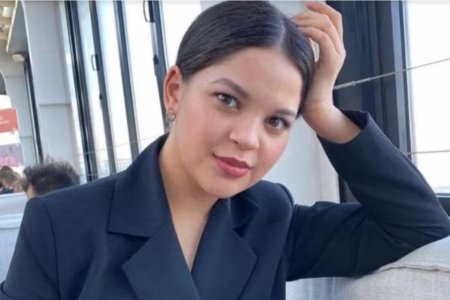
Russia is holding 25-year-old Leniye Umerova in solitary confinement with even her lawyer only allowed to see her twice a month. It is likely that the FSB are hoping through some methods to break the young woman down and try to get her to agree to whatever preposterous charges they lay. Olha Skrypnyk, Head of the Crimean Human Rights Group, has called this one of the most overtly fabricated cases against Ukrainian citizens that she has come upon. There were never any grounds for detaining the young Crimean Tatar, who was held for several months on one absurd administrative charge after another, before the FSB laid ‘spying’ charges which they can conveniently conceal by claiming them to be ‘top secret’.
Leniye is, at least, represented by Dmitry Dinze, a lawyer who has defended many of Russia’s Ukrainian political prisoners. No independent lawyer can prevent a politically commissioned ‘verdict’ and sentence, and Dinze will have been forced, under threat of criminal prosecution, to sign an undertaking not to reveal any details about the case. His involvement does, nonetheless, mean that Leniye will have a lawyer who is acting in her interests, and not, as state-appointed lawyers often are, simply there to sign papers and urge the detained person to ‘cooperate’ by admitting to the charges.
As reported, Leniye Umerova was initially detained on 4 December 2022 after she crossed the border between Georgia and Russia, trying to reach occupied Crimea where her father had recently been diagnosed with cancer. Leniye herself had left Crimea in 2015 and obtained her higher education in Kyiv, where she was working as a marketing specialist. She had visited occupied Crimea every year without any problem, but then Russia began its full-scale invasion of Ukraine. That, unfortunately, did not only make the journey to occupied Crimea much more difficult, with Leniye forced to travel through Bulgaria and Romania into Georgia. It also made her a victim of the Russian FSB’s appetite for political ‘trials’ of Ukrainian citizens.
She was detained while on the Tbilisi – Simferopol coach during the night from 3-4 December 2022 at a checkpoint in Northern Ossetia. She was told this was “for a further check and conversation”, with the Russian border guards (who are within FSB jurisdiction) removing her Ukrainian internal document, passport and her telephone. She was told that the Russian border guards would speak with her the following day, and sent to the Sova Hotel outside the city. She was taken, by taxi, in that direction, but via a road which is off limits to foreigners, where the taxi was duly stopped by traffic police. It seems near certain that this was a planned set-up to enable the first administrative charge of “infringing the rules for crossing the Russian state border (Article 18.1 § 1 of Russia’s code of administrative offences). A local court found her guilty of this and fined her (the fairly small amount of) 2,000 roubles, as well as ordering her deportation. Since there is currently no mechanism for organizing such expulsion, she was simply sent to a temporary holding unit for foreign nationals. Her parents found a lawyer who succeeded in getting the deportation order revoked, with the court even noting that Leniye posed no threat to Russia. All of this meant that there was no requirement for her to be imprisoned in a temporary holding unit.
Her release was clearly not part of the FSB’s plans. As she left the unit, she was seized by unidentified individuals who put a bag over her head and forced her into their car. She was taken to a district in Vladikavkaz where she was dumped just in time for a police car to turn up and demand that she come with them to the police station. She tried to find out why, with her question perhaps used as the pretext for accusing her of ‘disobeying the orders of an enforcement officer’. The Leninsky district court promptly ordered a 15-day term of administrative arrest, with a second, identical protocol over ‘disobedience’ drawn up almost immediately, supposedly because Leniye refused to give the officers her phone. A third 15-day sentence was imposed on 27 March, with Leniye taken to the temporary holding unit in Beslan. On 9 April, a fourth ‘disobedience’ protocol was drawn up, with the 15-day term of administrative arrest this time imposed by ‘judge’ Veronika Kolobkova, from the Sovietsky district court in Vladikavkaz. The fifth administrative arrest was on 26 April, By then, it was known that the FSB were holding Leniye’s passport and it seemed clear that they were fabricating criminal charges against her (as they had earlier done against Ukrainian Oleksandr Marchenko
On 4 May 2023, Leniye was taken to Moscow where, the following day, she was remanded in custody for two months by ‘judge’ Sergei Ryabtsev from the Lefortovo Court. The charge reported on the court’s website was of ‘state treason’ (Article 275 of Russia’s criminal code). Even if this refers to supposed ‘treason in the form of spying’, the charge makes no sense as Umerova is a Ukrainian citizen who could not commit treason against a foreign country. It is, in fact, extremely likely that she was targeted by the FSB because she had left Crimea and had not taken Russian citizenship.
On 30 June, the Lefortovo court extended her detention for four months, to 4 October 2023. Dinze appealed against this, asking that Leniye be placed under a signed undertaking to not leave Moscow and pointing out that her family were willing to find her accommodation in Moscow. All of this was, predictably, rejected by the Moscow city court on 4 July. The excuses, according to Dinze, were those essentially always used, namely that Leniye is a foreign national’ and that the charges against her are serious.
The charges on paper may well be serious, but they are also secret, with the reason for this almost certainly linked with their sheer absurdity. Had Umerova been wanted on suspicion of spying when she arrived at the checkpoint, there would have been no reason to stage a series of ever-more implausible administrative charges. Since the spying charge only appeared in early May, the FSB are presumably claiming some act of ‘spying’ after she crossed the border. This makes no sense as she was in a place that she did not know, and it was the taxi driver who must have chosen the route which, allegedly, crossed into a place prohibited to foreigners. Leniye’s letter from the Lefortovo SIZO [remand prison] gives grounds for believing that the FSB will not succeed in breaking her will and forcing her to admit to fictitious crimes. That, unfortunately, does not mean that they will not secure the conviction and sentence of up to 20 years that they doubtless want. The ‘courts’ in Russia, at least in cases involving Ukrainian political prisoners, invariably provide the verdicts demanded and turn a blind eye to seriously flawed or even evidently fabricated ‘evidence’. The latter is most often provided by ‘secret witnesses’ who have, very likely, never set eyes on Leniye Umerova, but presiding judges typically do not only allow such anonymous ‘witnesses’ but obstruct questions from the defence aimed at demonstrating the lies and discrepancies in their ‘testimony.’



